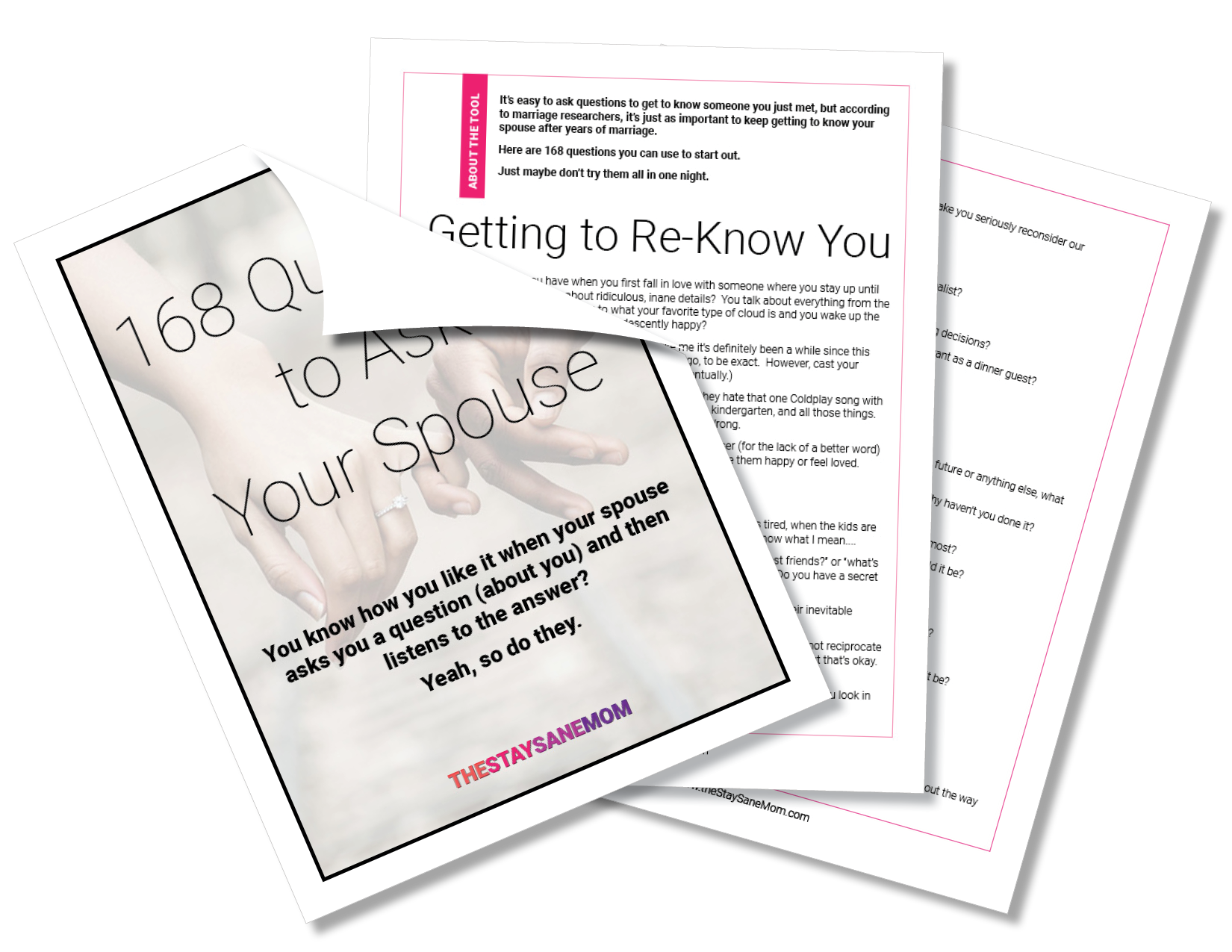How to Feel Connected To Your Spouse

How to Feel Connected To Your Spouse
There is one behavior that couples who stay married do an average of 86% of the time, but couples that get divorced only do 33% of the time. Learn exactly how to perform this critical marriage skill and feel more connected to your spouse.
Written by Liz Bayardelle, PhD | See Comments | Updated 12/11/2018
Want to cut to the chase?
168 Questions to Ask Your Spouse

Want to cut to the chase?
168 Questions to Ask Your Spouse
Get the Free Printable PDF Now
Get it NowHow to Feel Connected To Your Spouse
This post contains some affiliate links for your convenience. Click here to read my full disclosure policy.
Feeling connected to your spouse is one of the most magical feelings in the world. The birds sing, the sun shines, and all that other mystical fairy-dust seems to settle all over your humdrum life.
However, when that connection gets interrupted, distorted, or feels like it's beginning to degrade, it can have an equivalently negative impact on all the areas in your life.
The problem is that it can sometimes feel like you're helpless to control when you feel this happy, magical connection and when it seems to disappear for no reason.
Demystifying the Feeling of Connectedness
For those of you who have read my blogs on how to keep the romance alive in a marriage or on why it's important to keep getting to know your partner know that I'm a huge fan of the Gottman Method, which is the only (or only that I've read about) format for marriage therapy that's based on actual data, gathered from real couples, and analyzed using actual statistics (read: stamp of nerd approval).
Basically, in the late 1970s a psychologist Dr. John Gottman began doing research on married couples in search of what made a marriage good or bad. He assembled data on a crazy amount of data from the couples he studied (down to a second-by-second coding of the microexpressions on their faces as they conversed with each other) all in attempt to figure out how to predict which couples get divorced.
After completing his research, he wrote his findings in the now-famous famous book Seven Principles of Making Marriage Work. This concept of connectedness is dealt with in the third principle, 'turning towards' each other.
What is 'Turning Toward' Each Other
Imagine you're driving in the car with your spouse. Your spouse looks out the window and says "wow, that's a funny-looking car". Do you respond with a noncommittal "hmmm" or do you say "yeah, it reminds me of that one your crazy uncle used to drive"?
Either way, it this conversation doesn't seem like it would make a huge difference either way in the success of your marriage, but interactions like this have actually shown to be a huge predictor for the happiness and future longevity of a marriage. Here's why.
When your spouse made an offhand comment about the weird car, he was making what Gottman calls a 'bid for attention'. This is basically a conversation starter, subtle request for attention, or other kind of 'bid for connection'.
These 'bids for connection' happen all the time in a marriage (or any kind of relationship) without us even knowing they're happening. We walk by our spouse and casually pat their shoulder as we pass, we make a comment about something we see, we bring up something interesting that happened to us that day, or even just catch eyes and smile at them across the room. These are all examples of 'bids for connection'.
Now, when your spouse makes a 'bid for connection' you can either 'turn towards' that bid or 'turn away from' that bid.
Behavior that turns towards a bid would be (to use our above situations as examples) stuff like resting your head on your spouse's hand when they pat your shoulder as they walk by, responding to their comments about the things they see, asking a follow up question when they mention something interesting about their day, or making a funny face or winking at them when they catch your eye from across the room. All of these 'turning towards' responses to bids of connection will increase your marital connectedness, the feeling of intimacy, and the overall sense of happiness within your marriage.
On the other hand, if you ignore or otherwise 'turn away' from your spouse's bids for connection, it will do the opposite, decreasing your feeling of connectedness, reducing intimacy, and decreasing your sense of happiness within your marriage.
Both making your own bids for connection and turning towards your spouse's bids are equally important, so we'll go over each of them individually.
Making Bids for Connection
First, it's important to make bids for connection because, every successful bid for connection reinforces your bond and gives you the feeling that you are both in "it" together, that you're on the same page (even if it's for something as ridiculous as a weird car), and that you're connected as you go through your respective days.
There are a multitude of different kinds of bids for connection, far more than I could ever list here, but I will give you a quick list of different types or categories of bids for connection you can try. Not everything will feel natural for everyone, so it's important you pick the ones that feel authentic to your individual personality and marriage.
Types of Bids for Connection:
- Small physical touches (e.g. patting your partner's arm as you walk by)
- Random comments about surrounding objects or happenings (e.g. "That dog looks really happy to be on a walk.")
- Recounting past events (e.g. e.g. "I ran into Junior's 4th grade at the supermarket today.")
- Requests to interact (e.g. "Want to come into the kitchen and read the newspaper while I cook?")
Every time you make a bid for your spouse's attention, you're reaffirming your relationship in a small but significant way. According to Dr. Gottman's research, such little connections are actually hugely influential in the overall happiness of your marriage.
Recognizing Bids for Connection
While making bids for connection is important, the part most marriages have trouble with is in recognizing their spouse's bids for connections.
How many times are you so busy caring for a screaming toddler that you can't hear what your partner is saying? How often is he so in his head about work that he doesn't think to respond to something you've asked? How about late at night...are there times when you're both so tired you couldn't repeat back the last thing your partner said to save your life?
Yup. We've all been there. #marriage
The problem is that when one partner makes a bid for connection that goes without response, gets ignored, or otherwise goes unnoticed it takes a small dent in the feeling of connectedness or togetherness between the two of you.
And this makes sense. Even in a tiny dose, the rejection of reaching out for your spouse's attention does make one feel slightly less loved.
So how do you make sure you don't accidentally miss your spouse's bids for connection?
First, the fact that you're reading this article and asking these questions (I assume) means that you care enough about your marriage to pay renewed attention to these things. After reading about the importance of turning towards bids for connection (because, after all, it was a significant difference between the couples that stayed together and those that didn't) you'll pay just a little more attention when your spouse says something random, gives you an out-of-nowhere pat, or smiles at you from across the room.
Second, you can actually ask your spouse these questions. If you ask your spouse if they feel like you pay attention to them, if there are ever times they don't feel heard or feel ignored, or if there are ways they'd like to connect more. Sometimes I'm shocked by the information I get (crazy compliments and constructive criticism alike) when I ask my hubby open ended questions.
If you approach the matter with a very open, non-defensive, 'what can I do better' type of attitude, your spouse is most likely to respond with either confusion (e.g. "What do you mean? You're a great listener!") or with gratitude that you brought it up.
What to Do When Your Bids are Ignored
Finally, we get to the "hard part" of this topic. Marriage is, unfortunately, a group project. You can't control everything on your own, no matter how much we all might like to.
Nag, remind, cajole, and gritch all you want, but at the end of the day, you are only in control of your own actions.
I don't want to put the stereotype out there that men are clueless because I truly feel there are very few positive outcomes to sweeping, gender-based generalizations. And some men (my husband included) are more observant about nonverbal behaviors and other little nuances than I could ever hope to be.
However, if it happens to be the case that your significant other falls into the 'wouldn't know a bid for connection if it hit him in the face' category, there are still some things you can do about it.
Choose Your Moments
Just as there are times in your day when you are preoccupied, busy, or just plain exhausted, your partner probably has times that are better and worse to connect. I know I learned early in my marriage that my up-and-at-em-before-5-am hubby runs fast and hard all day and when 8 pm hits, all he wants is a warm bed. If I were to make the same bid for connection at 8 am and 8 pm I would get two drastically different responses. (At 8 am I'd probably get an energetic discussion and caffeinatedly twitchy hug, while at 8 pm I'd probably get a sleepy "mmmmmhmmm".)
This has absolutely nothing to do with me, with his feelings towards me, or with our marriage at all. It has everything to do with the fact that the screaming toddler is the only thing keeping him from falling asleep where he stands.
You know your spouse better than anyone else. Try and 'read the room' to see if there are other factors (e.g. work stress, rowdy kids, exhaustion, etc.) preventing them from turning towards your bids for connection).
Differences in Love Language
As popularized in Gary Chapman's awesome book The 5 Love Languages, different people express and receive love in different ways. If you've never heard of the concept or you want a refresher, check out my article on The 5 Love Languages for Dummies.
While some people might get immense fulfillment from sharing little touches (like holding hands or pats on the back), these acts might go completely unnoticed by others. The premise of the book (which is wonderful and well worth a read) is that there are five different ways people show and/or perceive love (physical touch, quality time, gifts, acts of service, and words of affirmation) and that different people prefer or 'speak' different love languages.
For instance, you might really feel connected by physical pats and casual touches, while your partner could feel closest to you when you spend time doing a fun activity together. If you express your love by touching them, they could completely miss the fact that you're expressing love. Similarly, if they expressed their love for you in lots of fun activities but no physical contact, you would feel equally neglected despite their good intentions.
This relates to bids for connection because if you and your partner 'speak' different love languages, you could be missing some of their bids for communication just because they're being expressed in a different love language and might, therefore, be off your radar.
Try figuring out what love language your partner speaks (either from experience, by asking, or by forcing them to take the official love languages quiz as I did with my poor hubby) and paying extra attention to bids for connection (or responses to your bids) that come in one of your partner's primary love languages.
Actual Communication
Now, if you're picking your moments right, making sure your spouse isn't distracted by other things when you make your bids, and you're checking for signals in their love language, it could possibly mean you actually need to have a real life conversation about it.
No, I do not mean go accuse them of not wanting to connect with you and pick a fight.
What I mean is to casually, non-confrontationally, drop a single comment into conversation about the type of missed bid that is most bothering you. This needs to be done at a good time (when you're both in relatively good moods and no one is outlandishly busy or tired) and with as little emotion as possible.
Try this on for size. "I really love talking about my day with you, but sometimes I feel like I'm talking at you. Do you mind engaging with me a little more so I don't feel like I'm boring you?"
Notice how that focused all on your needs and feelings, didn't accuse your partner of anything, and was phrased as a request not a criticism. The point here is to ask for good behavior, not punish them for missing your bids in the past. (Nothing good will come of that.)
Focus on one type of bid at a time and use this clear, unemotional, and nonconfrontational way of asking for what you need every once in a while (no more than once a day). Most likely your spouse does want to turn towards your bids, but they're too wrapped up in their own "stuff" to see how important it is to you.
If you try this for a while and it either provokes fights between the two of you or matters don't improve, it might be worth it to schedule a visit to a therapist, counselor, or unbiased third party of some sort. However, for a great majority of people dealing with 'turning away' behaviors, these simple reminders will be more than enough to jog your spouse into a more 'turning toward' response.
Now Go Turn Towards Each Other!
And there you have it. It sounds so incredibly simple, small, and silly, but these little moments throughout the day have been repeatedly proven (by actual research, mind you) to be a significant predictor of the success of a marriage. Try it out for a few days and drop a comment as to what you noticed. Had you been missing bids for connection? Did you notice anything different when you tried different kinds of bids? Let me know!
Start Your Next Step
168 Questions to Ask Your Spouse

Get Sanity, Delivered to Your Inbox.
Care to Share?




About the Author

Liz Bayardelle, PhD
Founder | Contributor
Liz (or Dr. Mommy, as her toddler started calling her after learning what a PhD was) is the happily sleep-deprived mom of a toddler (and professional raccoon noise impersonator), a sparkle-clad kidnado, a teenage stepdaughter, 200 cumulative pounds of dog, and herd of dustbunnies (if daily vacuuming doesn't occur). During nights and naptimes, she uses her PhD in business psychology as an author, speaker, and consultant. She also serves as an executive and principal for three companies, two of which she co-founded with her very patient (and equally exhausted) husband.





